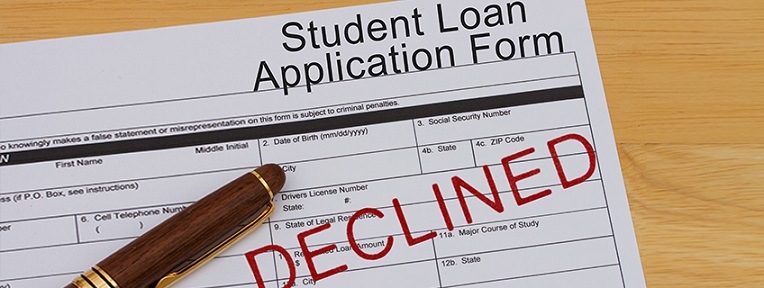
Common Reasons Why Student Personal Loan Applications Get Rejected
Posted on Wednesday, April 24th, 2024 | By IndusInd Bank
In pursuit of higher education, many students turn to personal loans to finance their academic endeavors. However, despite their best efforts, some find their loan applications rejected. Understanding the reasons behind these rejections is crucial for aspiring students seeking financial aid. In this blog post, we’ll delve into some common reasons why student personal loan applications get rejected and provide insights on how to overcome these hurdles.
1. Lack of Credit History:
One of the primary reasons why student personal loan applications face rejection is the absence of a credit history or a limited credit history. Most students have yet to establish a robust credit history, making them high-risk borrowers in the eyes of lenders. Without a proven track record of responsible credit usage, lenders may hesitate to approve loan applications.
Solution: Building a positive credit history early on is essential for students. Consider applying for a secured credit card or becoming an authorized user on a parent or guardian’s credit card to start building credit. Timely payments and responsible credit management will gradually strengthen your credit profile.
2. Insufficient Income or Employment:
Lenders assess the borrower’s ability to repay the loan, which includes evaluating their income and employment status. Students often have limited or irregular income, making it challenging to meet the income requirements set by lenders. Additionally, many students may not have a stable job or sufficient employment history, further raising concerns for lenders.
Solution: Explore alternative sources of income, such as part-time employment, freelance work, or paid internships. Providing evidence of steady income, even if it’s modest, can enhance your loan eligibility. Additionally, obtaining a cosigner with a stable income and good credit can strengthen your application.
3. High Debt-to-Income Ratio:
Even if students have a source of income, a high debt-to-income ratio can hinder loan approval. Lenders assess the borrower’s debt obligations relative to their income to determine their ability to manage additional debt. If your existing debts, such as student loans or credit card balances, consume a significant portion of your income, lenders may deem you overextended and reject your loan application.
Solution: Prioritize debt repayment and reduce your debt-to-income ratio before applying for a personal loan. Consider consolidating high-interest debts to lower your monthly obligations. Demonstrating a manageable debt load can improve your chances of loan approval.
4. Inadequate Documentation or Information:
Incomplete or inaccurate documentation can lead to delays or rejection of loan applications. Lenders require comprehensive documentation to verify the borrower’s identity, income, employment, and financial stability. Missing or incorrect information can raise red flags and result in application rejection.
Solution: Thoroughly review the loan application requirements and ensure that all necessary documents are provided accurately. Double-check the information provided to avoid errors or discrepancies that could jeopardize your application. Communicate openly with the lender and promptly provide any additional documentation requested to expedite the approval process.
5. Poor Credit Score or Credit Report Issues:
A low credit score or negative marks on your credit report can significantly impact your loan application’s chances of approval. Lenders use credit scores and credit reports to assess the borrower’s creditworthiness and gauge the risk of default. Delinquent payments, accounts in collections, or bankruptcy filings can signal financial distress to lenders, leading to application rejection.
Solution: Regularly monitor your credit report for errors or inaccuracies that could negatively impact your credit score. Address any discrepancies promptly by contacting the credit bureaus and providing supporting documentation. Focus on improving your credit score by making timely payments, reducing credit card balances, and avoiding new credit inquiries.
In conclusion, understanding the common reasons why student personal loan applications get rejected is essential for prospective borrowers. By addressing these issues proactively and taking steps to strengthen their financial profile, students can improve their chances of securing the funding needed to pursue their educational goals. With careful planning, responsible financial management, and perseverance, students can overcome obstacles and access the financial assistance they need to succeed in their academic endeavors.
If you’re looking for an instant personal loan at best-in-class rates, then do check out IndusInd Bank Personal Loan that is mindfully designed to fit into the varied needs of individuals as per their lifestyles. With IndusInd Bank Personal loan, you get to enjoy instant approval, quick disbursal, and flexible repayment tenure options. That’s not all, its application process is 100% paperless with minimal or low processing fee.
Disclaimer: The information provided in this article is generic in nature and for informational purposes only. It is not a substitute for specific advice in your own circumstances. Hence, you are advised to consult your financial advisor before making any financial decision. IndusInd Bank Limited (IBL) does not influence the views of the author in any way. IBL and the author shall not be responsible for any direct/indirect loss or liability incurred by the reader for taking any financial decisions based on the contents and information.



 Offers
Offers Rates
Rates Debit Card Related
Debit Card Related Credit Card Related
Credit Card Related Manage Mandate(s)
Manage Mandate(s) Get Mini Statement
Get Mini Statement
 categories
categories Bloggers
Bloggers Blog collection
Blog collection Press Release
Press Release


